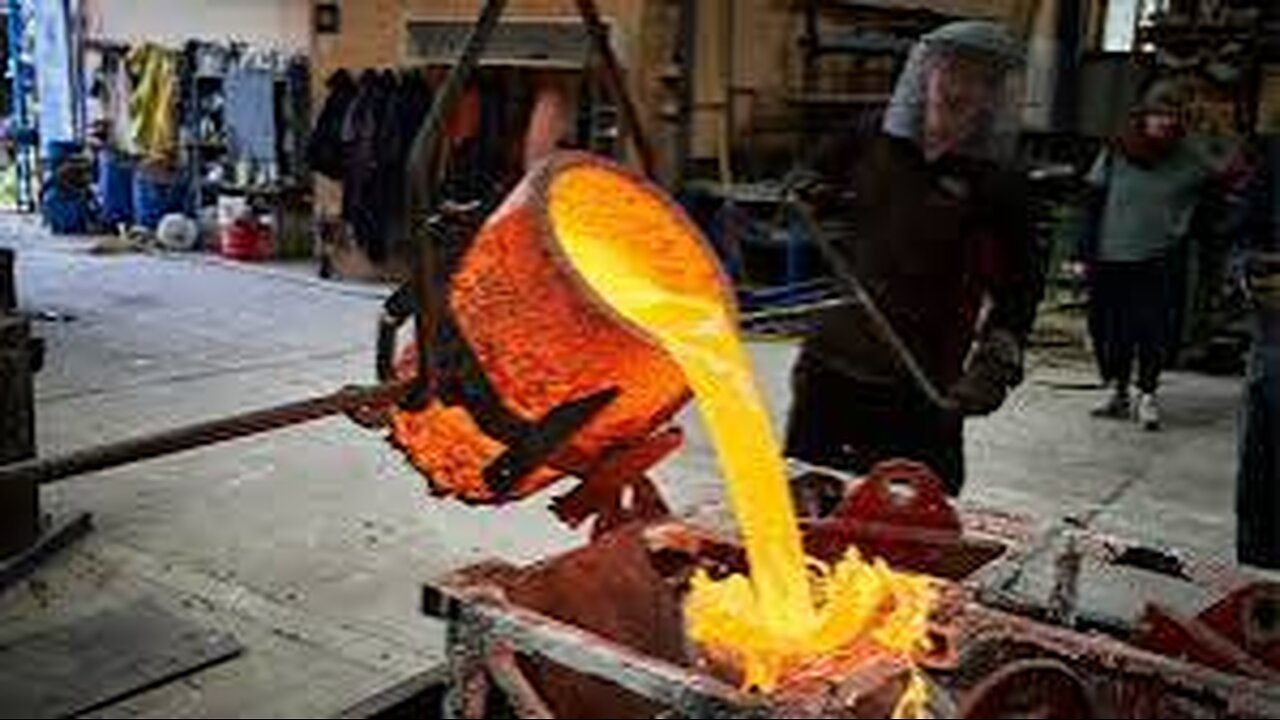Premium Only Content

How Does a Foundry Work?
How Does a Foundry Work?
A foundry is a factory that produces metal castings. Metals are cast into shapes by melting them into a liquid, pouring the metal into a mold, and removing the mold material after the metal has solidified as it cools. The most common metals processed are aluminum and cast iron. However, other metals, such as bronze, brass, steel, magnesium, and zinc, are also used to produce castings in foundries. In this process, parts of desired shapes and sizes can be formed.
Foundries are one of the largest contributors to the manufacturing recycling movement, melting and recasting millions of tons of scrap metal every year to create new durable goods. Moreover, many foundries use sand in their molding process. These foundries often use, recondition, and reuse sand, which is another form of recycling.
In metalworking, casting involves pouring liquid metal into a mold, which contains a hollow cavity of the desired shape, and then allowing it to cool and solidify. The solidified part is also known as a casting, which is ejected or broken out of the mold to complete the process. Casting is most often used for making complex shapes that would be difficult or uneconomical to make by other methods
What are the foundry types?
Sand casting utilises sand moulds to create metal castings, which form integral parts of vital machinery that is relied upon by over 80% of manufactured goods. In the foundries themselves, the fundamental difference that sets foundries apart is whether they are ferrous or non-ferrous; i.e whether they work using iron or iron-based metals such as steel, or other types of metals like aluminium, brass, or bronze.
Chemically bonded sand casting
Our equipment is tailor-made for use in chemically bonded or “no-bake” mould production, where sand is mixed with a binder to create a uniform and durable mould, ready to be used in the casting process. This is also known as “air set” mould production.
Who and what is this suitable for?
Our ranges of specialised foundry machinery designed for the no-bake foundry sector can be used in a variety of situations and industries, such as:
Jobbing foundries
Prototype castings
Heavy engineering
Specialised automotive castings
Casting for mining solutions
Construction equipment castings
Petrochemical industry castings
-
 2:05:11
2:05:11
Inverted World Live
5 hours agoCyborg Jellyfish, Cockroach Spies, and the Humanoid Holocaust w/ Joe Allen | Ep. 96
72.8K5 -
 3:30:50
3:30:50
Laura Loomer
5 hours agoEP139: Loomer Shuts Down Gazan Visas
23.8K63 -
 2:48:44
2:48:44
TimcastIRL
5 hours agoTrump Claims Total Victory, Court Eliminates $500M Fine In NY Fraud Case | Timcast IRL
163K57 -
 LIVE
LIVE
SpartakusLIVE
6 hours agoVerdansk QUADS || #1 MACHINE is BACK taking NO DAYS OFF (until I feel like it)
453 watching -
 LIVE
LIVE
Alex Zedra
3 hours agoLIVE! Ready or Not
597 watching -
 29:05
29:05
Man in America
14 hours agoDid the Fed Just Admit Gold Will Be Revalued? This Could Change EVERYTHING
27.5K10 -
 45:54
45:54
MattMorseTV
4 hours ago $3.67 earned🔴55 MILLION immigrants are UNDER REVIEW. 🔴
26.5K35 -
 3:15:07
3:15:07
TheItalianCEO
5 hours agoLast Stream before I go - Playing The Finals
18.3K -
 1:14:43
1:14:43
JustPearlyThings
4 hours agoPearl Reacts: 20 Black Conservatives DESTROY Radical Feminist Activist | Pearl Daily
39.7K17 -
 LIVE
LIVE
This is the Ray Gaming
3 hours ago $0.17 earnedThursRAY Night LIVE with the BOYS! | Rumble Premium Creator
95 watching